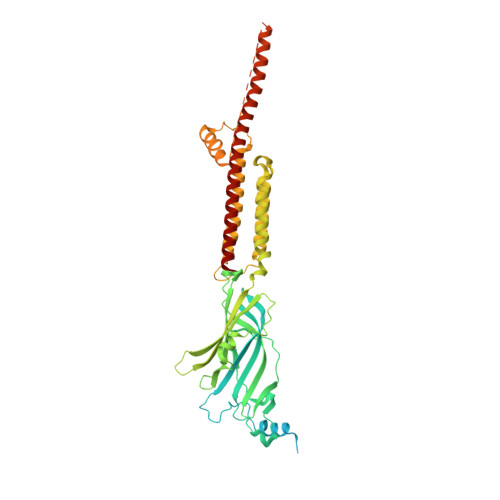Superiority of the Triple-Acting 5-HT 6 R/5-HT 3 R Antagonist and MAO-B Reversible Inhibitor PZ-1922 over 5-HT 6 R Antagonist Intepirdine in Alleviation of Cognitive Deficits in Rats.
Grychowska, K., Lopez-Sanchez, U., Vitalis, M., Canet, G., Satala, G., Olejarz-Maciej, A., Golebiowska, J., Kurczab, R., Pietrus, W., Kubacka, M., Moreau, C., Walczak, M., Blicharz-Futera, K., Bento, O., Bantreil, X., Subra, G., Bojarski, A.J., Lamaty, F., Becamel, C., Zussy, C., Chaumont-Dubel, S., Popik, P., Nury, H., Marin, P., Givalois, L., Zajdel, P.(2023) J Med Chem 66: 14928-14947
- PubMed: 37797083
- DOI: https://doi.org/10.1021/acs.jmedchem.3c01482
- Primary Citation of Related Structures:
8CC6, 8CC7 - PubMed Abstract:
The multifactorial origin and neurochemistry of Alzheimer's disease (AD) call for the development of multitarget treatment strategies. We report a first-in-class triple acting compound that targets serotonin type 6 and 3 receptors (5-HT-Rs) and monoamine oxidase type B (MAO-B) as an approach for treating AD. The key structural features required for MAO-B inhibition and 5-HT 6 R antagonism and interaction with 5-HT 3 R were determined using molecular dynamic simulations and cryo-electron microscopy, respectively. Bioavailable PZ-1922 reversed scopolamine-induced cognitive deficits in the novel object recognition test. Furthermore, it displayed superior pro-cognitive properties compared to intepirdine (a 5-HT 6 R antagonist) in the AD model, which involved intracerebroventricular injection of an oligomeric solution of amyloid-β peptide (oAβ) in the T-maze test in rats. PZ-1922 , but not intepirdine, restored levels of biomarkers characteristic of the debilitating effects of oAβ. These data support the potential of a multitarget approach involving the joint modulation of 5-HT 6 R/5-HT 3 R/MAO-B in AD.
Organizational Affiliation:
Faculty of Pharmacy, Jagiellonian University Medical College, 9 Medyczna Str., 30-688 Kraków, Poland.

















